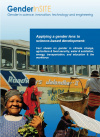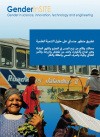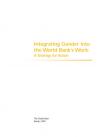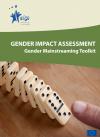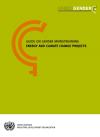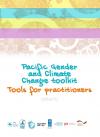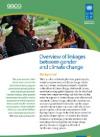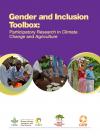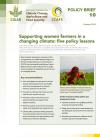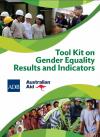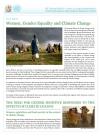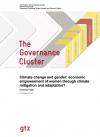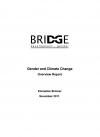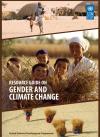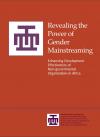Resources
21 Feb 2018
A booklet of fact sheets to provide an overview of the gender dimensions of the six GenderInSITE thematic areas: climate change, agriculture & food security, water & sanitation, energy, transportation, and education & the workforce
TYPE: Fact sheets
21 Feb 2018
A booklet of fact sheets that present an overview of the gender dimensions in the six GenderInSITE thematic areas: climate change; agriculture and food security; water and sanitation; energy;
transportation; and education and the workforce
TYPE: Fact sheets
12 Oct 2016
World Bank, 2002: Strategy identifies gender-related barriers to poverty reduction and sustainable development; and recommends appropriate actions to reduce these barriers; it is intended to establish an enabling environment
to foster country-led, country-specific strategies for changing the gender patterns that are costly to growth, poverty reduction, and human well-being.
12 Oct 2016
European Institute for Gender Equality (EIGE), 2016: Toolkit provides guidance for government and other institutions to assess whether their policies, programmes, action plans and projects reduce, maintain or increase the gender inequalities between women and men.
29 Sep 2016
UNIDO, 2014: Guide provdes a general background of gender concepts and the gender dimensions
of sustainable energy projects, as well as a step-by step roadmap of gender mainstreaming
in the different stages of energy and climate change project cycles.
23 Sep 2016
SPC, SPREP, et al., 2015: Toolkit is designed to support climate change practitioners in the Pacific islands region to integrate gender into their programmes and projects, aimed at climate change professionals working in national governments,NGOs, regional and international organisations who are involved in managing and implementing climate change programmes.
.
TYPE: Case studies, Toolkits
23 Sep 2016
UNDP, 2014: Series of policy briefs and training modules on gender and climate change for practitioners and policy makers in Africa with themes of specific relevance to Africa, including a general overview of climate change issues, adaptation, agriculture and food security, equitable energy access, and climate finance.
REGIONS: Sub-Saharan Africa
TYPE: Policy briefs, Training
23 Sep 2016
CCAFS/CARE International/ICRAF, 2014: Manual introduces participatory strategies and tools for research to guide the implementation of climate smart agriculture and efforts to achieve food security in rural communities, intended for NGO practitioners and program designers interested in diagnostic and action research for gender sensitive and socially inclusive climate change programs
20 Sep 2016
CCAFS/CGIAR, 2015: Policy provides five policy lessons to support women farmers in relation to climate change, based on evidence from research in low- and middle income countries and offers guidelines for crafting gender-responsive climate policies at global and national levels.
TYPE: Policy briefs
19 Sep 2016
Asian Development Bank/Australian Aid, 2013: Toolkit presents a menu of gender equality outcomes, results, and indicators that may be selected or adapted by development practitioners to ensure that gender perspectives are incorporated into development initiatives, and to monitor and evaluate gender equality results.
TYPE: Toolkits
16 Sep 2016
UN WomenWatch, 2009:
Fact sheet provides an analysis of how women are affected by climate change and how they respond, together with references to relevant United Nations mandates and information sources
TYPE: Data
16 Sep 2016
GTZ, 2010:
Working paper traces the ways in which women’s economic empowerment through climate mitigation and adaptation fosters economic growth and socioeconomic development, reduces poverty, keeps environmental problems in check, and increases the potential for adaptation
TYPE: Reports
16 Sep 2016
BRIDGE, IDS, 2011:
Report maps pathways for making climate change responses more gender aware and potentially transformative, arguing that gender transformation should be both a potential end goal and an important condition of effective climate change responses and poverty reduction [Available in English, Spanish and French]
TYPE: Reports
16 Sep 2016
UNDP, 2009:
Guide for practitioners and policy makers on the linkages between gender equality and climate change and their importance in relation to the achievement of the MDGs, highlighting why it is important to include women in climate change policy and programming, and demonstrating how women’s contributions can strengthen the effectiveness of climate change measures.
TYPE: Policy briefs, Reports
31 Aug 2016
InterAction, 2005
Study examines the implementation and impacts of gender mainstreaming in sixteen African communities
REGIONS: Sub-Saharan Africa
TYPE: Case studies
- 1 of 2
- next ›




